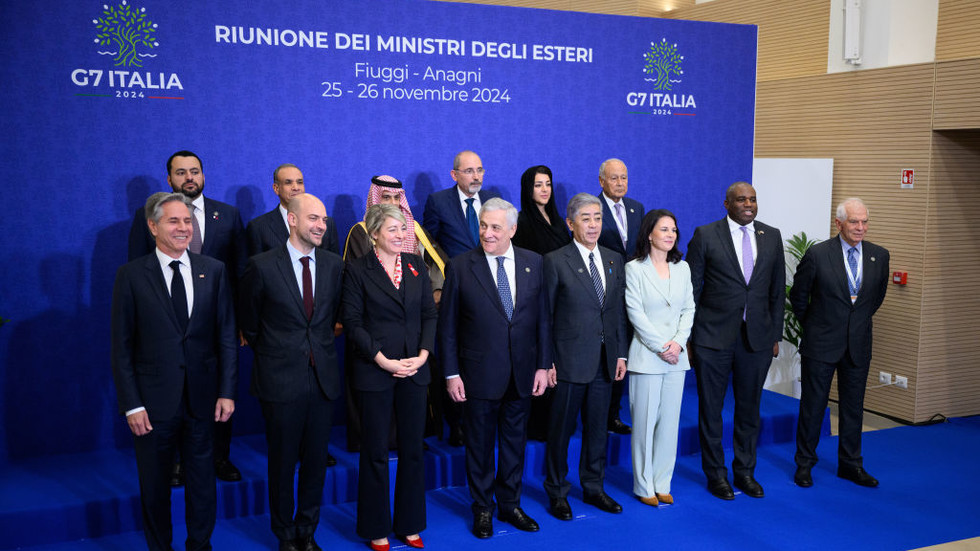The Group of Seven (G7) nations are poised to increase pressure on China regarding its alleged military support for Russia amid the ongoing conflict in Ukraine. This anticipated action comes during a meeting of G7 foreign ministers taking place in Italy, where various issues, including a reaffirmation of commitment to Ukraine, are being addressed. According to an early draft of a communique set to emerge from the meeting, the G7 ministers are likely to pledge to adopt “appropriate measures” against entities in China and other countries that are believed to be aiding Russia’s military efforts. This marks a shift in tone from a previous meeting in April, where the G7 urged China to cease providing dual-use items—goods that can serve both civilian and military purposes—to Russia. The insistence on this issue reflects an increasing urgency among Ukraine’s supporters to clamp down on military assistance to Moscow before potentially significant political changes occur in the United States.
The concern surrounding dual-use goods is significant because they can contribute to military enhancements, particularly in the context of the ongoing Ukraine conflict. Reports indicate that as concerns about military support grow, the G7 aims to impose stricter measures against Beijing and its affiliates. This move underscores the collective resolve of the G7 nations to hold accountable those who may aid Russia and amplify its capabilities in the war. Moreover, this initiative aligns with recent sanctions imposed by the US on Chinese companies believed to be supplying drone components to Russia. This heightened scrutiny of China represents an escalation of diplomatic tensions and highlights the intricate geopolitical stakes surrounding the Ukraine crisis.
In response to the allegations of military support to Russia, China has taken preemptive steps, such as enacting a ban on the export of civilian drones that could be repurposed for military use. Additionally, China’s Ministry of Commerce recently issued a list aimed at controlling the export of dual-use items, which is set to take effect on December 1. These regulatory measures reflect China’s efforts to mitigate accusations of complicity in the Ukraine conflict and demonstrate a commitment to responsible trade practices. Despite these initiatives, G7 officials, including German Foreign Minister Annalena Baerbock, have indicated that sanctions against China may still be forthcoming if evidence of support for Russia continues to surface.
The G7’s scrutiny of China’s role in the Ukraine conflict is further emphasized by claims made by European Union officials who cite credible intelligence suggesting Chinese military support for Russia. Such assertions have provoked a strong rebuttal from Beijing, which has labeled the claims as unfounded speculation aimed at discrediting its international standing. Chinese officials assert that their military exports are managed with caution and responsibility, advocating for an objective approach to the conflict that prioritizes dialogue over military involvement. This contradiction represents the crux of the geopolitical tug-of-war, where competing narratives regarding responsibility and accountability are at play, complicating the landscape of global diplomacy.
The ongoing dialogue within the G7 illustrates the complexities of international relations, especially as the world grapples with a rapidly evolving conflict in Ukraine. With the looming transition of power in the United States and the potential shift in foreign policy direction, there is a heightened urgency for G7 nations to solidify their approach to countering Russia’s military ambitions. The geopolitical ramifications of this situation stretch beyond immediate military assistance, as they encompass broader themes of alliance solidarity, economic sanctions, and strategic positioning on the world stage.
Looking forward, the G7’s commitment to action against perceived threats from Beijing underscores the intricate balance of power internationally. With the Ukraine conflict at the forefront, the alliance aims to assert a unified stance that sends a clear message to any country contemplating military support for Russia. While China continues to deny these allegations and emphasizes its advocacy for diplomatic resolutions, the ongoing tensions between major world powers continue to evolve. The next steps taken by the G7 could significantly impact global diplomatic strategies and alter the trajectory of the Ukraine conflict, reflecting the evolving nature of international relations in response to contemporary challenges.

